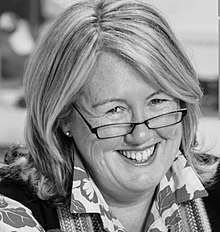Mary-Anne Williams
| Mary-Anne Williams | |
|---|---|
 Mary-Anne Williams in 2018 | |
| Born | Sydney, Australia |
| Alma mater | University of Sydney; Stanford University; University of Oxford; Harvard University; University of Edinburgh |
| Awards | ATSE Fellow; ACS Fellow; Australasian Distinguished Doctoral Dissertation Award; IBM Faculty Award; Pauli Fellowship; #16 on 365 Women in STEM. |
| Scientific career | |
| Fields | Artificial Intelligence |
| Institutions | UTS and Stanford University |
| Doctoral advisor | Norman Foo at University of Sydney |
Mary-Anne Williams FTSE is an Australian academic, Distinguished Research Professor at University of Technology Sydney, Fellow at CODEX at Stanford University,[1] and Director of the UTS Magic Lab.[2]
She is listed among Robohub's "Top 25 Women in Robotics",[3][4] and celebrated on the First International Day of Women and Girls in Science. [5]
Williams is a Fellow of the Australian Academy of Technological Sciences and Engineering (ATSE), and a Fellow of the Australian Computer Society (FACS). She has been a speaker at major events including the 2016 World Science Festival.[6], United Nations WSIS Forum on the Impact of AI, Australian Strategic Policy Institute. She shared her views on the impact of AI on Human Rights during a panel at the [7] Australian Human Rights Commission Technology Conference.
Williams works on AI, Robotics and Law. She leads the UTS-Softbank Social Robotics Partnership, and the UTS partnership with the Commonwealth Bank in Social Robotics.[8] She discussed the impact of Artificial Intelligence on compassion and human rights with the Dalai Lama in Sydney in June 2018,[9].
Williams has a PhD in Computer Science and a Master of Laws. She is co-founder of the AI Policy Hub.[10] She continues to lead the UTS RoboCup Team that she established at UTS in 2002. This team were the Top International team in 2004, won the Human-Robot Interface Award in 2017. In 2018 UTS RoboCup Team won the Tour Guide Challenge with the highest score of any team on any test in the history of the Social Robotics League. [11]
Williams is known for her foundational contributions to the field of belief revision.[12] Belief Revision is a fundamental area in Artificial Intelligence. It provides representations and mechanisms for computers to develop a set of beliefs and to revise them over time as they receive new information. Belief revision plays a critical role in Explainable Artificial Intelligence. It allows AI systems to generate explanations of their behaviour that help human interpret, understand, predict, and importantly trust AI systems.
Over the last three decades she has provided solutions to several open research problems related to finite representations of beliefs, the iteration of belief revision mechanisms, and the relevance of changes and explanations. She developed the first computational models and anytime algorithms for Belief Revision Operators to be applied to real world problems[13][14]
Publications
- Robot Social Intelligence, International Conference on Social Robotics ICSR 2012: Social Robotics pp 45–55 Retrieved on 1 November 2017
- Decision-Theoretic Human-Robot Interaction: Designing Reasonable and Rational Robot Behaviour International Conference on Social Robotics
- ICSR 2016: Social Robotics pp 72–82 Retrieved 1 November 2017
- Technological Opacity, Predictability, and Self-Driving Cars "Cardozo Law Review, Vol. 38, 2016"
- "A social robot in a Shopping Center", December 2016
- "A social robot helping at check-in and at the gate, Sydney International Airport", August 2017
- " Field Work enabled by a unique Academic-Industry Partnership", August 2017
See also
References
- ↑ "Mary Anne Williams". Stanford.edu. Retrieved 18 November 2017.
- ↑ "Professor Wozniak takes on new role at Australian university". cnet.com. 20 October 2014. Retrieved 18 November 2017.
- ↑ RoboHub Top 25 Women in Robotics 2013, robohub.org
- ↑ "Six Impressive Australian Women Scientists", 11 February 2016, sbs.com.au
- ↑ "International Day of Women and Girls in Science 2016", un.org
- ↑ "Speaker on Artificial Intelligence and Social Robotics". worldsciencefestival.com. Retrieved 18 November 2017.
- ↑ [https://tech.humanrights.gov.au/%7Ctitle= Australian Human Rights Commission Technology Conference
- ↑ "Mary Anne Williams". cba.com.au. Retrieved 18 November 2017.
- ↑ "AI Law, Ethics and Policy". Happiness and Its Causes. Retrieved 1 August 2018.
- ↑ "AI Policy Hub". AI Policy Hub. Retrieved 18 November 2017.
- ↑ "UTS RoboCup 2018". UTS. Retrieved 1 August 2018.
- ↑ "On the Logic of Theory Base Change Proceeding JELIA '94 Proceedings of the European Conference on Logics in Artificial Intelligence Pages 86-105". ACM Digital Library. Retrieved November 18, 2017.
- ↑ Williams, Mary-Anne; Sims, Aidan (2000). "SATEN: An Object-Oriented Web-Based Revision and Extraction Engine". arXiv:cs/0003059.
- ↑ "Social Robotics Applications". CBA. Retrieved November 18, 2017.